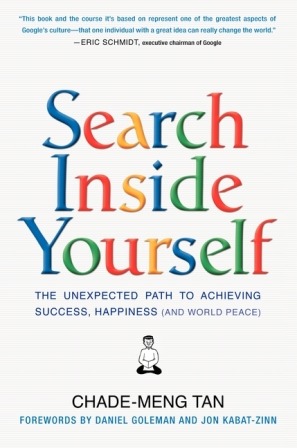Search Inside Yourself is a book written by early Google employee Chade-Meng Tan, whose goal is to "create the conditions of world peace". And he wants to do this by making people happy, based on the premise that happiness creates peace. This is essentially a book on meditation written from the point of view of an engineer. The book is simply and humorously written, but here's an EVEN simpler summary: 5 lessons for those who don't have the time to read an entire book just to be happy.
As befitting an engineer, Meng spends a good amount of time proving why you should meditate. He explores studies on the "happiest man on earth" and scientifically defines happiness, how to measure it, and how the practice of meditation can increase it. He then demonstrates how improved happiness yields improved emotional intelligence and how this has a strong correlation with success in the business world (even for engineers).
2. Mindful meditation is not about controlling emotions, it is about observing them at "higher resolution"
Meng makes the assertion (again through scientific data) that people who are good at meditation do not shut off anger or pain. They actually react more quickly to those emotions because they are more aware of them. But by recognizing their emotions more clearly, they are able to recover from the emotions much more quickly and make choices on how they want to react.
3. Meditation is just breathing, and you're doing it right.
If you're looking for detailed meditation practices, this book is not it. Meditation is simply focusing your mind, and in this book, that simply involves observing your natural breath. Two analogies really sticks. Meditation is like exercise. You are training your "brain muscles" to focus on something (like your breath). When you lose focus, you just bring it back. Losing focus is not failure. It's an opportunity to exercise you brain and bring focus back. Like doing bicep curls, losing focus, and then regaining focus is exercise. Maintaining focus is like riding a bike. You lose balance, then regain balance. When you are able to do this quickly, it looks like you are balanced. Likewise, you will always be losing focus and regaining focus. When you can constantly regain focus quickly, it looks like you ARE focused.
4. Personal Motivation
To be happy and successful, you have to know what that means to you. First step is Alignment: knowing what you're looking for. The next step is Envisioning: setting a vision for future happiness. The final step is Resilience: the ability to keep moving towards your goals despite setbacks. The last bit requires a positive attitude. Rationally, if 51% of things are going well in your life, you should be happy. However, negative results have 3 times the impact on our brains compared to positive results. This makes being happy difficult. Meng suggests that to counteract this, you think of neutral events as positive. For example "I'm not in pain right now." "I am well fed."
5. Habits for Social Interactions
Empathy has been proven to help people succeed, and it feels good too. The key to this is approaching people and thinking "This person is just like me." If you have trouble empathizing, Meng believes that this is something that can be practiced. You can literally set an alarm every day that says "Wish for people to be happy." By doing it, you ARE empathizing, and soon this becomes natural. Again, you are "exercising".

